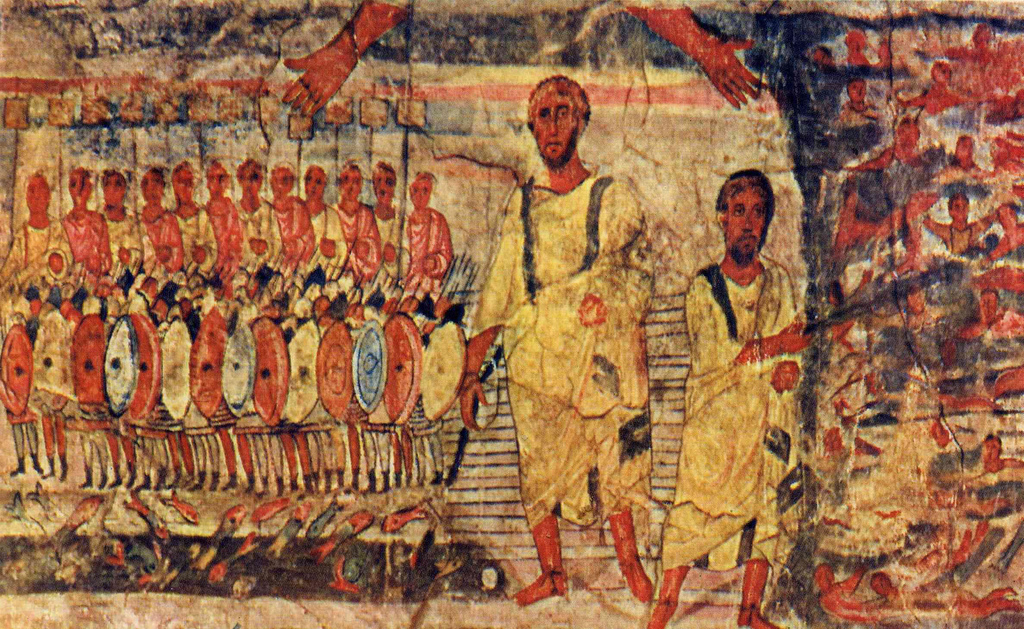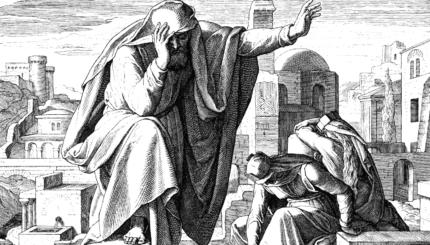No mention of creation or God resting or the blessing the Sabbath received appears in the commandment in the book of Deuteronomy. Instead, Moses states, “Remember that you were a slave in the land of Egypt and the Eternal your God freed you from there… therefore the Eternal your God has commanded you to observe the Sabbath day.” This explanation appears somewhat removed from the day itself, not as closely tied to it as the other [which links it to the seventh day of creation on which God rests]. How does God’s freeing Israel from Egypt lead to sanctifying the Sabbath?
The answer unfolds in layers. To begin with, the image of God in this version of the commandment matches the image of God in the first commandment, which reads, “I the Eternal am your God who brought you out of the land of Egypt….” This is a familiar God. This is the God who works through history, the God whose liberation of the Israelites from Egypt forms a central theme of the Bible and lies at the core of Jewish life. In addressing the Israelites shortly before his death, Moses is speaking to people who witnessed that liberation or heard about it directly from their parents or other family members.
For them, God as creator may seem remote. God as redeemer is the God they know. Calling up that aspect of the divine in the Sabbath commandment stirs in them memories of the slavery they suffered and God’s feats in delivering them from it. Observing the Sabbath God ordained is a way of memorializing their deliverance and honoring the deity who brought it about.
But in addressing the Israelites, Moses is also addressing generations to come, for as the Passover teaches, every one of us must view ourselves as though we personally came out of Egypt. This version of the Sabbath command brings us, too, closer to the God we know most about, the God who freed our ancestors from oppression and who stands for justice and liberation.

Help us keep Jewish knowledge accessible to millions of people around the world.
Your donation to My Jewish Learning fuels endless journeys of Jewish discovery. With your help, My Jewish Learning can continue to provide nonstop opportunities for learning, connection and growth.
The Israelites’ Experience Connects Shabbat with Liberation
On one level, then, the Sabbath commandment in Deuteronomy is about remembering the Israelites’ slavery and showing gratitude to God for redeeming them and their descendants from it. On a deeper level, it is about translating that memory and redemption into treating others with kindness and generosity, especially those who are weak and vulnerable as the Israelites once were.
A midrash relates that when Moses went up to Mount Sinai to receive the from God, the angels objected. “Ruler of the universe,” they complained, “You propose to give that precious treasure to a creature of flesh and blood!” Urged by God to respond to them, Moses asked, “What is written in this Torah You are giving me?”
God began with the first commandment, “I the Eternal am your God who brought you out of the land of Egypt.” Moses turned to the angels and said, “Have you been down to Egypt? Have you been enslaved to Pharaoh? Why then should you have the Torah?” Moses continued to challenge the angels on each commandment. “Do you do any work that you need to rest?” he asked defiantly when God came to the Sabbath commandment.
After hearing Moses’ responses, the angels admitted their error and showered him with gifts. He had shown them that from their heavenly perches they could not possibly understand the suffering below, and that is why humans both deserved the Torah and needed it to guide them in applying the experiences of slavery and hard work to their lives as free people. It could not remain in heaven.
In the Sabbath commandment, applying Israel’s past history to its current life means giving slaves, servants, and resident aliens a day of rest and serenity each week equal to that enjoyed by the master and mistress of a household. To assure that equality the commandment in Deuteronomy spells out, “so that your male and female slave may rest as you do.” There is no equivocating here. The Sabbath belongs to all members of the household. For those in charge, remembering Egypt transmutes into remembering how it feels to be mistreated and therefore into being vigilant about treating others humanely.
I often quote my father’s description of how, in his early years of employment, a poor immigrant boy working in the men’s clothing industry, workers labored seven days a week without a break. It wasn’t until the 1920s and 1930s that the United States enacted labor laws to ease the workers’ burdens, and such laws still don’t exist in many parts of the world. Yet four thousand years ago, my father would say, the Bible established a day of rest a week for everyone, including the lowliest of servants and the animals they used in their work.
Why Does the Torah Still Permit Slavery?
But now another question crops up: Why does the Bible permit slavery altogether? It was a question raised with some passion in an informal Bible study group I lead for some friends. “How can you speak of slaves resting on the Sabbath like their masters as if that were such a terrific thing?” one member said angrily when we discussed the Sabbath commandment in Deuteronomy. “The whole institution of slavery was immoral. Why didn’t the Bible abolish it?”
Yes, why didn’t it? What virtue is there in giving slaves a day of rest when nobody should ever be enslaved? This is not the place to undertake a long investigation into the Bible’s attitude towards slavery. But the short answer, relevant to the Sabbath law, is that in ancient times slavery was a fact of life, closely woven into the economic and social fabric of society. If, as the rabbis often said, the Torah speaks in the language of human beings, it would have been futile to try to abolish an institution so integral to that world. Unfortunately, today, when the world no longer accepts slavery, millions of people still suffer from it–women sold into prostitution by their families or tricked into it by men trafficking in female trade, starving children and their parents trapped in slavelike conditions to pay off debts–and none has the protection of Sabbath laws.
The Torah surely is uncomfortable with slavery and leans firmly toward mitigating the slaves’ lot, although from today’s perspective we would want more. Unlike any other early code, it forbids returning runaway slaves to their masters. It holds a slave owner liable for the death penalty if he kills a slave, and if he injures a slave, the slave goes free. Many biblical laws also legislate great leniency toward Hebrew slaves, generally desperately poor people who had sold themselves into servitude as a means of support. “They are My servants,” the text says, meaning that Jews owe fealty only to God and may not become slaves to one another. In fact, the first law the Israelites receive after the Ten Commandments concerns releasing Hebrew slaves in their seventh year of labor. That ban on Hebrew slavery lays the moral basis for the eventual abolition of all slavery.
The Sabbath command bolsters that moral basis. It applies to all slaves, both Hebrew and foreign (who may have been acquired as war captives), and makes no distinctions in providing all with Sabbath rest. The Torah stands alone among ancient law codes in concerning itself in this way with slaves’ wellbeing. The Torah stands alone also in its deep concern about “strangers,” outsiders who lived among the Israelites but were not of them. Without strong roots in the community, these people could easily have been abused or pressed into slavery, as the Israelites were in Egypt. Therefore, like slaves, they were singled out for consideration on the Sabbath.
Shabbat and Ethical Behavior
Throughout the Torah, reminders of the redemption from Egypt serve as touchstones for ethical behavior. (Someone has said that more than thirty biblical laws relate to the exodus from Egyptian bondage, and almost all of them deal with moral issues.) The Sabbath commandment in Deuteronomy fits into that pattern. Building on the same theme, the prophets never ceased to inform people of the ties between Shabbat and social justice. In one breath, Ezekiel condemns the wealthy who treat strangers badly, wrong orphans and widows, and also profane the Sabbath. And Isaiah equates observing “what is right” and “what is just” with the joy of observing the Sabbath. Classical Jewish thought associates Shabbat with compassion and liberation for all from oppression.
Reprinted with permission from The Fourth Commandment, published by Bell Tower.
Sign up for My Jewish Learning’s RECHARGE, a weekly email with a collection of Shabbat readings and more to enhance your day of rest experience.



